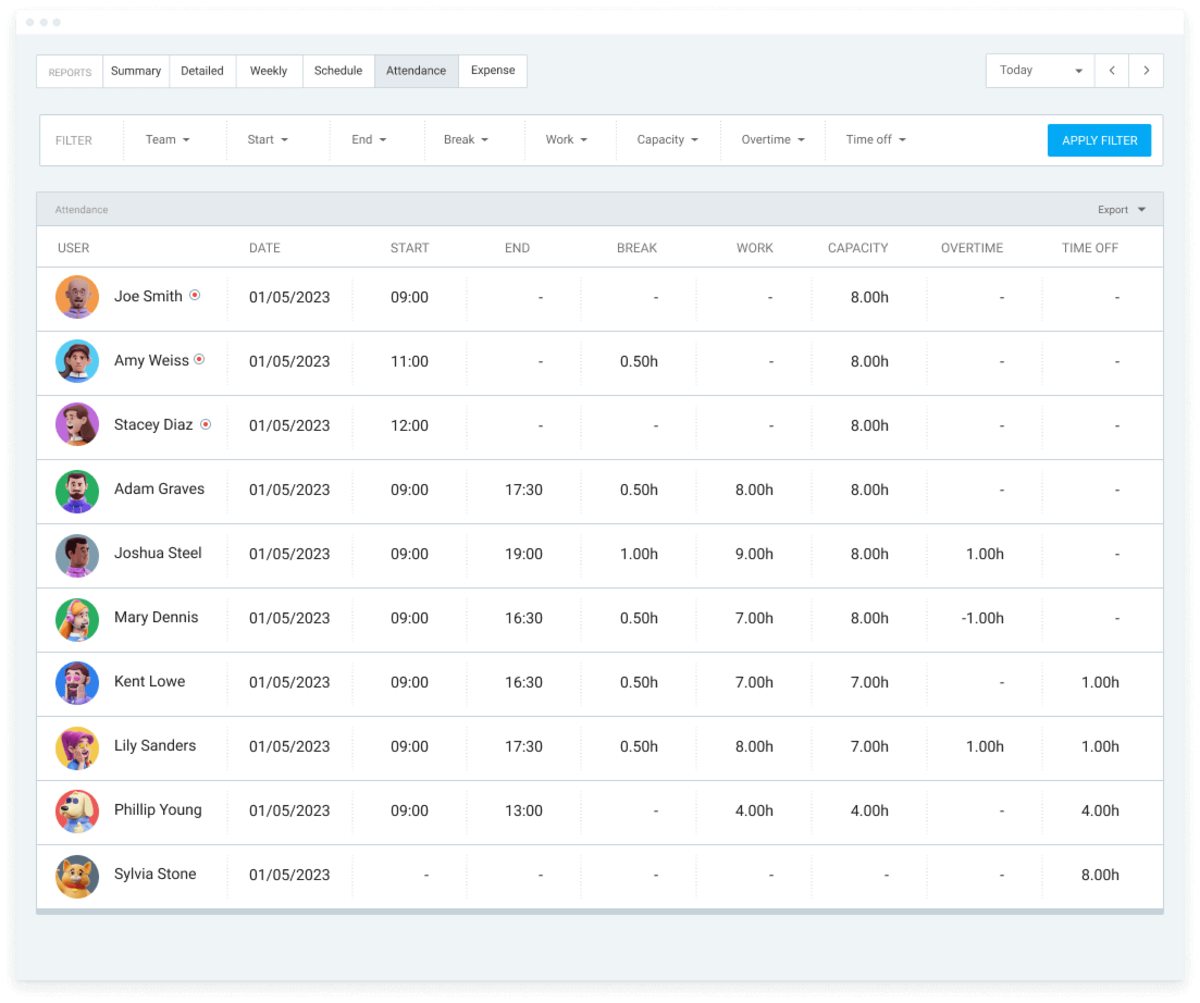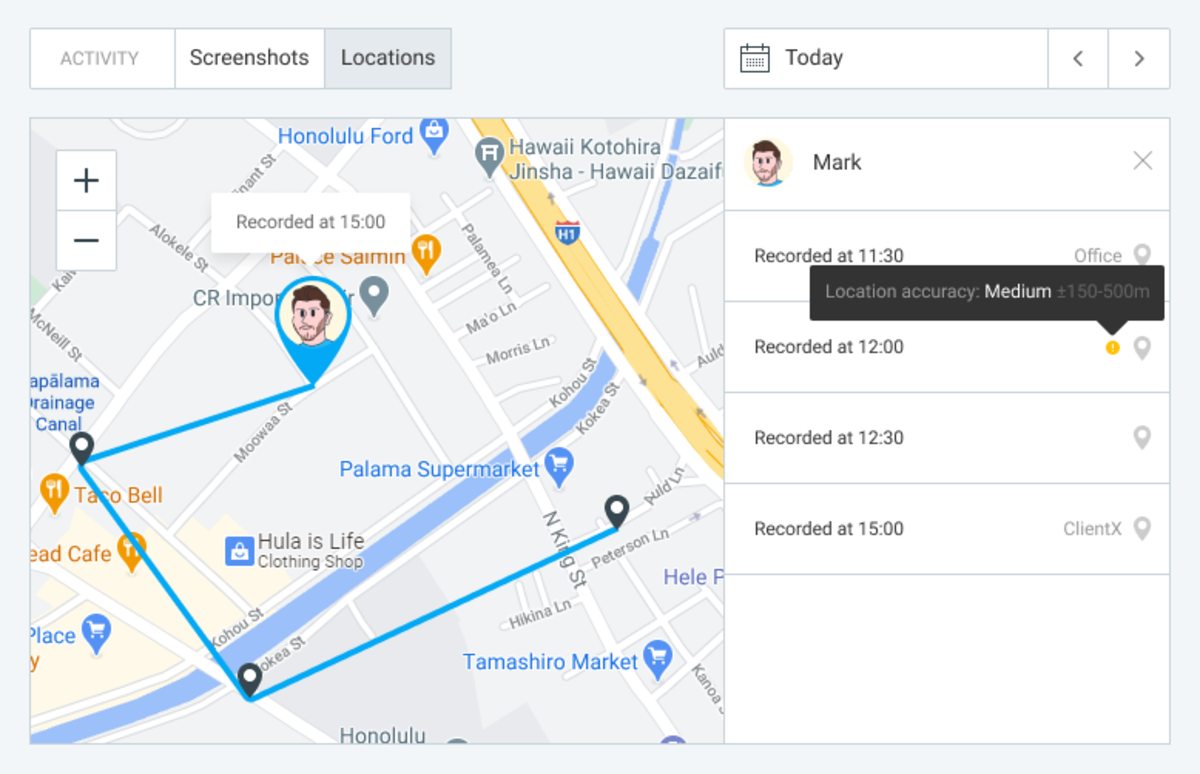Ever snapped out of deep work only to realize that half your staff is offline?
To your surprise, they’ve clocked out before the end of their working hours.
While your employees may have had valid reasons to leave work, one thing remains clear:
They didn’t ask you first.
To handle employees leaving work early without permission, rebuild trust, and maintain respect in the workplace, follow these ways.

#1: Pinpoint the effects of staff leaving work without your ‘OK’
When you notice a spike in early departures, it’s important to assess how it affects your business.
First, identify the operational consequences.
Employees leaving early can impact the quality of work and the chances of meeting project deadlines. Plus, they’re committing time theft — getting paid for hours they aren’t working.
The bottom line is unreported absences are eating into your company’s profits.
In turn, you have to ask responsible workers to cover for their absent teammates. But can you afford to overburden your best players?
Equally concerning is the domino effect of early clock-outs and their toll on productivity, as Dmytro Tymoshenko, CEO of a software company, notes:

“Early leave of certain employees can negatively affect company productivity and influence team dynamics. If you, as a leader, don’t address it in time, it might cause other employees to behave similarly.”
Next, consider the legal consequences.
According to US labor laws, repeated absence without permission is misconduct if the employee fails to provide a valid reason (e.g., a medical appointment or sick leave). As a result, the business owner can opt for a disciplinary action.
Personal injury lawyer Mark Hirsch advises businesses to comply with local employment law when handling habitual absences:
“Check employment contracts, labor laws, and the impact on output to ensure you’re following the law and aware of any problems that might arise.”

“Check employment contracts, labor laws, and the impact on output to ensure you’re following the law and aware of any problems that might arise.”
So, make sure your actions are in compliance with the law to minimize legal risks when handling unauthorized employee clock-outs.
💡 CLOCKIFY PRO TIP
Managing international teams? Learn about global time-tracking laws to prevent legal disputes and ensure fairness.
#2: Ask employees why they’re leaving work early without permission
Before taking action, have a heart-to-heart with your workers about their repeated absences.
Experts on workplace collaboration advise companies to communicate effectively with workers. That means having frequent and meaningful conversations where employees feel heard and understood.
Here’s an eye-opener: Business owners can boost employee productivity by up to 25% through effective communication.
In conversation with staff who leave work early, Jonathan Goldberg, founder of a jewelry business, tries to understand their motivations and provide support:

“We encourage an immediate conversation with their manager to understand their reasons. Often, personal challenges may be at play, and finding out helps us offer appropriate support while maintaining productivity.”
According to HR manager Tsvetelina Nasteva, showing compassion in your private talks with early leavers can help fix the root problem:

“There’s often more to the story than meets the eye. By approaching these conversations with empathy, I’ve often been able to find mutually beneficial solutions.”
In any case, open communication is key.
Understanding why unreported absences happen will help you find productive ways to promote a healthy work-life balance among employees.
💡 CLOCKIFY PRO TIP
Explore the importance of work-life balance and how it impacts employee behaviors and attitudes toward work.
#3: Define clear rules to discourage early departures
Creating a straightforward protocol for leaving work early without permission ensures employees respect your rules.
First, set clear expectations about attendance.
A well-defined attendance policy (or rules ensuring employee compliance with their work schedule) should:
- Explain how to ask permission to leave work early,
- List the consequences of unapproved departures, and
- Minimize unjustified absences to improve productivity.
According to Parker Warren, founder of an SEO agency, your rulebook should eliminate any uncertainty among staff:

“I put policies, which concern working hours, breaks, and time off, in clear terms so that there is no ambiguity. For example, I drafted a document listing valid reasons for leaving the workplace early and detailed the channels to use.”
Hence, a transparent policy outlines good and bad excuses for leaving early without permission — and how they’d be treated.
If your employees are leaving work without permission, implement attendance reports to track daily presence, absence, and time off work.

Second, stress the consequences of unpermitted absences.
Early leavers contribute to a toxic work environment, hurting staff workload and morale.
So, remind workers that they risk the following types of disciplinary action for leaving work early:
- Written warning — informing employees about misconduct and the steps for improvement,
- Suspension without pay — temporarily suspending workers without pay,
- Demotion — moving employees to a lower position, and
- Dismissal — terminating their employment.
In explaining these consequences, entrepreneur Marin Cristian-Ovidiu promotes accountability:

“Employees need to gauge for themselves how their actions affect the entire operation, from workflow disruption to the potential for disciplinary measures.”
On a similar note, business owner Kraig Kleeman recommends a consistent approach to managing rule-breaking employees:

“Leaving work early without permission may result in formal notice or reduced pay. The main thing here is consistency. Don’t make exceptions unless you have a legitimate reason.”
#4: Provide incentives for employees to stay at work
Reasons to leave work early can range from burnout to boredom. That’s why you must offer various incentives that persuade staff to keep working.
Research shows that happy and motivated employees bring 23% more profits to your company than unhappy workers.
Speaking from experience, business owner Kraig Kleeman highlights the role of motivation in getting employees to stay on the job:

“If you want employees to stay, make them want to stay. Sure, some days will be long and hard, but if the workplace is a positive and motivating environment, your team will be less tempted to leave early.”
To create a stimulating work environment, you should frequently reward workers and acknowledge their productive work.
Entrepreneur Kraig Kleeman shares his approach to offering incentives in the workplace:

“I have seen great success in offering incentives, such as flexible hours or days of telecommuting, as a reward for achieving goals. In addition, celebrate the successes of your employees. A simple cheer during a team meeting can make all the difference.”
Interestingly, entrepreneur and lawyer Milly Barker demonstrates how a company can use early leave to drive employee efficiency:

“Hit your targets, and you can leave early guilt-free. One time, half our team was sneaking out early on Fridays. Instead of cracking down, we made ‘Summer Fridays’ official. Productivity shot up.”
But what if early leavers are bored or frustrated because their job no longer meets their professional needs?
Instead of hiring new staff, you can offer existing employee roles that better align with their career aspirations.
The bottom line: You can encourage your staff to work efficiently until EOD by providing benefits and recognizing their hard work.
💡 CLOCKIFY PRO TIP
Uncover the best ways to increase your workers’ productivity.
#5: Achieve efficient employee tracking with Clockify
The rise of remote work has made it hard for businesses to measure employee productivity.
Hidden from view, some employees may take advantage of the flexibility by leaving work early without permission.
While off-site workers may be out of sight, automation ensures they’re NOT out of mind.
In fact, employee monitoring software like Clockify has set the standard for tracking the work activity of both on-site and remote workers.
In a world where data privacy is a top priority, Clockify helps companies stay compliant with local regulations while monitoring their employees.
With our user-friendly app, you’ll know exactly where and how your employees spend their working hours:
- GPS tracking — monitor employees’ location on the map once they’ve clocked into the mobile app,
- Scheduling — create clear work schedules for each employee with defined start and end times, and
- Reminders — set up notifications to remind employees to track time after they’ve been idle for too long.
Now let’s see how our cost-effective time tracker can help you handle early leavers and improve their behavior.
Using GPS data, you can address employees about any unreported absences during work hours.

After discussing their inactivity, you can easily update their time entries at once with the bulk edit option.
Our app’s scheduling and automatic reminders boost responsibility by showing employees that their presence at work is being logged.
With time-tracking, Clockify helps you build a culture of accountability, increase work productivity, and prevent unauthorized early departures.



